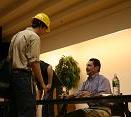|
|
|
|
Articles > Wounded Ronin - A Gamer's Guide To Clearing Firearm Stoppages
|
|
|
|
|

|
|
|
A Gamer's Guide To Clearing Firearm Stoppages and
Recognizing Malfunctions Like A Professional
An Essay Brought On By The Extremely Irresponsible And Unrealistic Animations of Farcry 2
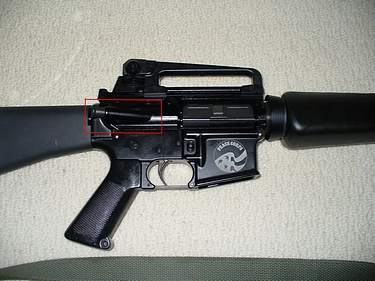 The red box highlights the forward assist.
The red box highlights the forward assist.
I have recently picked up Farcry 2 on a Steam sale, and was excited to learn that the game had implemented
firearms stoppages related to weapon cleanliness and condition. However, when I actually started to play Farcry 2,
I was dismayed to see that the weapon stoppages, and the remedies to those stoppages, were not portrayed in a
realistic manner. Apparently the game designers had gone through all the trouble to very detailed but wrong way
to try and remove stoppages, but inexplicably did not take the small amount of time it would have required at the
beginning of the project before doing any animation to learn about the types of stoppages which realistically
occur, and how to realistically clear them.
This bothers me for two reasons. In the first place, the designers of Farcry 2 went through a lot of trouble to
try and create an immersive and detailed game world, albiet one in which after the intro taxi ride every single
person you encounter goes out of their way to initiate suicidal all-out lethal force assaults on you the moment
they so much as catch a glimpse of you, and when I see incorrect animations relating to firearms, to me it greatly
undermines the sense of detail and realism the game is trying to create. Secondly, because the animations are
detailed, many players who don't have the opportunity to work with firearms in real life might get the wrong
impression about how to correct problems with their gun should they ever have one in real life. Today, I
participate in shooting competitions, and I hold an NRA Range Safety Officer certification; however, many
years ago, I lived New York City, where the powers that be have a psychologically disordered obsession
with keeping military pattern rifles out of the hands of law abiding citizens. At the time, many of my
impressions about operating firearms, including clearing stoppages, came from the early versions of America's
Army, which turned out to be a good thing, because that game tended to portray all aspects of firearms
operation in a very realistic manner with very detailed animations from which it was possible to absorb
a significant amount of knowledge regarding how to properly aim a rifle, the importance of posture and
stability with regard to accuracy, and how to reload and "unjam" an AR 15 or M 16. The animations from
America's Army gave me a reasonable starting mental framework for when I began to handle and learn about
firearms for the first time from a qualified instructor. However, as I played Farcry 2, I felt like the
detailed animations were likely to give people misconceptions about the safe and professional operation of
firearms, and that someone could even put themselves or others in danger if they attempted to act out
firearm manipulations as portrayed in the game. Therefore, I have decided to write this article outlining
why the animations in Farcry 2 are incorrect, and how to clear the most common stoppages when they happen
to your firearm in real life.
What Is The Professional Way To Clear Firearm Stoppages, And How Does Farcry 2 Fuck It Up?
In the first place, let's review firearm stoppages and malfunctions as portrayed in Farcry 2. Here is a handy
and entertaining YouTube compilation:
http://youtu.be/VpWxIEeIKFE
Before continuing, I need to define some vocabulary that will be used in this article. In the context of
firearm operation:
- A "stoppage" refers to something that happens that disrupts the normal functioning or
cycling of a firearm, but which can usually be quickly cleared or remedied on the spot. Firearms are
usually designed so that the most common stoppages can be quickly cleared "in the heat of battle".
- A "malfunction"
occurs when a firearm becomes mechanically broken and must be repaired or serviced before it can be safely operated
again. It's not usually possible to fix a malfunction in the middle of a firefight or competition, but since
Farcry 2 does feature exploding guns, I'll need to at least talk about malfunctions below.
- The "slide" on a handgun
is the top part of the handgun that moves whenever the handgun is fired, which contains an ejection port where
spent brass is ejected.
- Generally if a handgun is empty after having been fired the slide is designed to
lock back in its rearmost position, held in this position by a part called the "slide lock".
- The "action" on a
firearm is a general term for the system by which the firearm cycles expended casings out of the chamber and fresh
rounds into the empty chamber. An action may be designed to operate automatically, or be operated manually by the
user.
I should probably also state that although I'm about to write about pistols and rifles, I really don't know
anything about grenade launchers or rocket propelled grenades. If for some reason you're operating one in the
future and it stops working, you're on your own, ha ha!

A Kimber TLE 2 Custom with the slide locked back.
On the right side of the firearm you can see the empty ejection port.
As you can see in the YouTube video, in Farcry 2, when your character experiences a stoppage with a pistol or submachine
gun, his response is to tug valiantly on the slide, sometimes with his left palm covering the ejection port, and
occasionally whack the bottom of the magazine. After a mighty struggle, the firearm is back in operation! This is
misleading. Although tapping the magazine and then racking the slide of a pistol is a valid way to clear the most
commonly occuring stoppages, the animation performs the actions in the wrong order, and continues
going about them in the wrong way. Firstly, you should tap the magazine before racking the slide, because
if the stoppage is caused by the magazine not being properly seated, you would continue to have the same stoppage
occur repeatedly even if you succeeded in manually cycling a fresh round into the chamber of your firearm by racking
the slide. Secondly, if for any reason the slide is stuck, i.e. you cannot simply rack it on your first
attempt, it is downright comical and idiotic to waste time by continuing to jerk on it hoping that for
some reason even though you couldn't rack it a second ago, you'll be able to rack it now, especially now
that your left hand is obstructing the ejection port on your firearm. If something is physically blocking
some moving part of your firearm, obviously simply trying to force the blocked mechanism to work with your
hand is not going to an intelligent solution. Instead at that point in time you would either switch to a
different firearm, grab another available weapon, tackle your enemy if he's standing right next to you and
somehow you're still alive, or run for safety and examine your firearm to determine the nature of the problem
and clear the stoppage, time permitting. But enough with saying what you wouldn't do; how would you generally
deal with a stoppage in real life?
Before going any further, I need to state the three fundamental rules of firearms safety.
- One, keep your finger off the trigger until you are about to shoot. When manipulating your firearm your finger
should be far away from the trigger.
- Two, never point a firearm at anything you are unwilling to destroy. When manipulating your firearm make sure
the muzzle is not pointing towards another person; if the firearm unexpectedly went off, would you kill someone
you didn't intend to?
- Three, be aware of your target, and what is beyond it, since bullets tend to go through people, drywall, bricks,
and boards, and can continue to fly through the air and kill someone for over a kilometer, depending on the
type of firearm and ammunition; if you shoot a man who is standing in front of a house, your round will very
likely rip through the man and continue into the house behind him, and possibly kill or injure one of the occupants
of the house.
If we're going to be talking about use of firearms in real life instead of in video games, it's very important to
understand these basic safety rules, because if you accidentally killed someone, or gave someone a permanent handicap
while handling a firearm, or if you accidentally blew off your left hand because you passed it in front of the muzzle
at exactly the wrong moment, as the old saying goes, "you can't put the bullet back into the gun". Momentary
inattention with a firearm can lead to a life-changing tragedy.
In real life, firearms stoppages are classified by some experts into three types: Type 1, Type 2, and Type 3, the most common
being Type 1 and Type 2.
Type 1 refers to when you squeeze the trigger on your firearm, and you hear a click instead of a bang.
It is caused when you have an empty chamber (i.e. you inserted a loaded magazine and then simply
pulled the trigger, forgetting to first manually cycle the first round into the chamber of your firearm),
or when the cartridge in your chamber is a dud, so that when the firing pin hits the primer on the cartridge,
nothing happens, and so a round is not propelled down the barrel, and there's no energy to
cycle the action of the firearm and load a fresh cartridge into the chamber. Should this
happen, the textbook remedy is to whack the bottom of your magazine to ensure that it is seated properly,
and then to manually rack the slide on your firearm, which would manually eject the dud round, and/or
cycle the next round into the chamber of your firearm. In my personal experience, military and police
operators will always tap the bottom of their magazine, since they carry their firearms around with them
all day, and there is a higher chance that over the course of their day the magazine eject button might
have gotten pushed, and their magazine is not properly seated. In contrast, competitive shooters only
load their firearms right before they're about to shoot, and they usually omit the magazine tap to save
time, since in their case it's quite unlikely that their magazine has become improperly seated. Outside
of an urgent situation, the operator is advised to wait ten seconds for the sake of safety before clearing
a Type 1, just in case the gunpowder inside the cartridge is burning slowly, and the round will be discharged
a few seconds after the trigger is pulled instead of immediately after the trigger is pulled.
Type 2 refers to a stoppage caused by an expended casing somehow getting stuck in the ejection port of
the firearm and preventing the normal cycling or operation of the firearm. This is the reason why it's comedic
for the Farcry 2 animation to show your character trying to clear a stoppage with his hand covering the ejection
port of the weapon; by doing that, he is likely to cause another stoppage, or make his stoppage worse by jamming
up the ejection port and slide of the firearm with even more objects. This is one of the most common stoppages,
and the textbook remedy is the same as for the Type 1 stoppage: tap your magazine, and rack the slide. This
normally works well in a properly maintained quality firearm, because if you rack the slide forcefully and keep the
ejection port clear, any obstructing brass should fly out of the firearm. However, in my personal experience,
I've had situations with one of my firearms, a Kimber TLE 2 Custom 1911, where this often did not work, and I
would need to follow the procedure for clearing a Type 3 stoppage, outlined in the next paragraph.
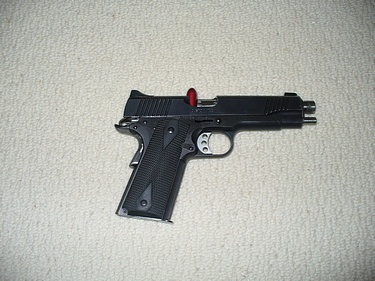
The dummy round is stuck in the action, preventing the normal cycling of the firearm.
Tap the bottom of the magazine and manually rack the slide to clear the action.
Type 3 refers to a stoppage which occurs when an expended casing remains in the chamber of a firearm
instead of having been removed and ejected by normal cycling of the slide. At the same time, the firearm
tries to push a fresh round from the magazine into the chamber, but since the chamber is blocked by the unejected
casing, the fresh round jams into the rear of the casing, and the entire mechanism locks up hard with all the recoil
spring tension fighting your attempt to manually clear the stoppage. This is considered a critical failure of the
firearm, and the textbook thing to do is to immediately switch to another weapon. However, if this has happened to
your only weapon, or you're in competition so your life isn't on the line, the textbook way to clear this stoppage
is as follows: manually pull the slide of the firearm all the way to the rear, manually lock the slide back using
the slide lock, and then eject the magazine, using both hands to forcefully strip the magazine if needed, and drop
the magazine on the ground in the interest of speed. Manually rack the slide three times to ensure that the chamber
is clear of brass, and then reload the firearm with a fresh magazine, manually chamber a round, and then re-assess
the situation and continue firing if justified. Assuming you haven't been shot multiple times by your enemy in the
time it took you to do this, ha. In my personal experience, I often find it difficult to lock the slide of the
weapon back in this situation due to the large amount of spring tension I need to fight in order to do so, and
I've personally had more success with simply stripping out the magazine from the weapon, racking three times,
and reloading. In a worst case scenario, it may be necessary to use a cleaning rod to try and remove the brass
from the chamber if it is not possible to accomplish this by racking the slide on the firearm, or even have a
gunsmith take the firearm apart. In a quality combat firearm that has been properly maintained, this is a very
uncommon stoppage, although I do see things like this happen in specialized competition firearms that tend to be
rather finkickey, since they're designed to prioritize extreme accuracy and recoil compensation over reliability.
I've also read that horrendous things like this tended to happen with the first run of M16A1s used in Vietnam...ugh!

I borrowed this image from ranchdogmolds.com since my picture was a little blurry.
It shows the same thing as mine does, but with better focus.
Some of the stoppage animations for shotguns and rifles in Farcry 2 show the slide or action of the firearm locked all
the way back with a piece of brass or expended shotshell stuck in the action. The action on the firearm is open all the
way and the casing is portrayed as being still stuck on the extractor, as opposed to being free of the extractor, and simply
wedging the action open. In real life, this would almost never happen, because although you might get a piece of brass stuck
on the extractor, there would be no reason for the action to lock in a fully open position unless the magazine were empty,
which it generally isn't when this stoppage comes up during gameplay. Instead, the brass being stuck on the extractor would
end up causing one of the stoppages outlined above as the action tries to close again with the piece of brass still stuck
inside it. Hilariously, your character's solution to this situation is to start banging on the firearm with his fist.
I didn't realize that in Farcry 2 we were role playing cavemen! Please, never do this. I guarantee it wouldn't remove
the casing in this situation, and you're really going to hurt your hand ramming it into hardened steel. The situation
described is probably going to create a Type 3 stoppage, described above. If a firearm does this, it probably needs to
be serviced, as something is probably wrong with the extractor and/or ejector.
Besides for the Type 1, Type 2, and Type 3 stoppages, I'll cover one other stoppage that I've seen, in which the weapon
clears the chamber, but when it tries to feed a fresh round into the chamber, the new cartridge gets stuck part of the
way into the chamber. If nothing happens when you squeeze the trigger, and when you look at the firearm you notice that
the slide is almost all the way forward but seems to be just a few milimeters out of place, this is what I'm describing.
This is called having a cartridge stuck "out of battery". In properly maintained quality pistols, I believe that this is
usually caused by the slide short-stroking instead of going all the way back like it is supposed to, as I've mostly seen it
occur with homemade reloaded cartridges, which tend to be less energetic than factory ammunition. In my experience this causes
the slide to lock up very hard and it becomes impossible to manually rack. My only solution has been to whack the rear
of the slide to force the round fully into battery. I usually have to hit the rear of the slide pretty hard and it often
hurts my hand. Once the round is fully into battery, the firearm continues functioning normally. In order to prevent
problems like this from happening, many people who shoot a lot of homemade ammunition will switch a weaker recoil spring
into their firearm. I don't think most people will experience this unless they shoot homemade ammunition. Interestingly,
as far as rifles are concerned, this problem was pretty common with the first run of M16A1s used in Vietnam, probably due
to improper cleaning and maintenance, and as a result the design of the M16 was modified to include a "forward assist", a
button on the right side of the rifle which the operator could whack to try and force the stuck action and round forward
into the chamber. When I practice with my AR, I'll occasionally get a round out of battery if I attempt to manually cycle
the action but don't do so forcefully enough, but when this happens, I can easily take care of the problem by tapping my
forward assist.

The dummy round is out of battery. You can tell that this is the case because the slide is not locked
all the way forward, and we can see the dummy cartridge is not fully seated in the chamber. You may be
able to bring the firearm back into operation by whacking the rear of the slide forward and forcing the
cartridge into the chamber. Otherwise, try racking the slide to eject the out-of-battery cartridge.
To summarize, in the vast majority of instances, when you are using a properly maintained semi or fully automatic
box-magazine-fed firearm of quality, if the firearm fails to fire or fails to complete cycle, you may remedy this by
whacking upwards on your magazine and the manually racking the slide to feed the next round into the chamber. It is
important to rack the slide forcefully and all the way back or else you may cause a Type 3 stoppage. Should you encounter
a great deal of physical resistance when you attempt to rack the slide, you might have a Type 3 or some other unusual
stoppage, so simply jerking on the slide with might and main is likely not going to get your firearm working again, and
has a chance of making the problem worse. Also, if you wave the firearm around and flop it back and forth like the
Farcry 2 animation portrays, you would be violating firearms safety by pointing your muzzle all over the place, eg.
at your teammates, bystanders, etc. Please do not beat on the side of the firearm with your fist as you may injure
yourself and this does not in any way constitute a solution.
What About Exploding Firearms?
Farcry 2 portrays firearms exploding on the operator! While it may seem dramatic, this can happen in real life. In
professional circles, this is known as a "Kaboom!", which is usually abbreviated as "Kb!" in writing. Obviously if
your firearm explodes it's out of action, so in this section, I will cover malfunctions such as Kb!s, as well as the
circumstances and conditions which lead to them.
The most common way for a Kb! to happen is when someone attempts to fire a cartridge, usually homemade, that has
way too much chemical energy in it, because there's too much gunpowder, and/or the wrong type of gunpowder. Every
firearm is designed to handle a certain range of pressures inside of its action. Naturally if those pressures are
greatly exceeded, the result may be an explosion. This can be very dangerous as it tends to send metal fragments
flying everywhere and since you tend to shoulder firearms near your eye, you could be blinded by said fragments.
Furthermore the hands holding the weapon tend to be injured. Usually they don't get blown off per se, since quality
firearms are designed to protect the user as much as possible even in the event of a Kb!, but there can be significant
injury and nerve damage to the hands and fingers. It is extremely rare to have this problem with factory ammunition.
Usually it occurs with homemade cartridges either because the person making the cartridge foolishly thinks it will be
cool to make a super powerful cartridge that exceeds the specifications of his weapon, or else because the person making
the cartridge wasn't paying attention and accidentally put two measures of powder into one cartridge.
Another common way for a Kb! to happen is if the barrel of a firearm somehow gets obstructed or plugged, and the
operator doesn't notice and pulls the trigger anyway. As the gasses expand in the chamber and the bullet is
propelled down the barrel, it collides with the obstructing object and destroys the firearm. Usually, though,
the firearm won't explode per se when this happens, although it's possible that it will, but the barrel will
split open or swell. The firearm is useless for anything but spare parts or a club at that point. The barrel
on a firearm may get obstructed or plugged by foreign objects if the muzzle touches or drags on the ground for
some reason, or if the operator creeps through a bush with the firearm. If you take a hunter education course
in order to get a hunting license, the instructor will tell you to completely unload your firearm and make sure
that the barrel is unobstructed if your muzzle ever touches the ground, or gets dragged through a bush. Another
common way for a barrel to become plugged is if a cartridge the operator tried to fire contains a primer, but either
is missing gunpowder, or if the gunpowder for some reason does not ignite. There's not enough energy and expanding
gasses to send the bullet all the way down the barrel, so the bullet gets stuck somewhere in the barrel. An experienced
operator will know that this has happened because his gun won't go "bang!" as loudly as it normally does when this
happens, and the recoil will feel weak. Unfortunately even if the operator knows that his barrel is plugged with a
bullet, his firearm has malfunctioned and is out of commission since a gunsmith will need to remove the offending
bullet from the barrel by disassembling the firearm and pushing it out with a cleaning rod while taking care not
to damage the barrel.
Finally, a Kb! is possible in old or surplus firearms that don't fit together properly, especially if someone has
taken part of an action from one firearm and put it into another without checking to make sure that everything fits
together within specs. Basically, before firing a vintage or surplus firearm, you should go to a gunsmith and ask
him to check whether or not it's safe to fire, so that you don't end up with hardened steel fragments in your face
and eyes.
Unlike portrayed in Farcry 2, firearms do not just generally explode on you. They only do so under very specific
circumstances. In the event that a firearm explodes on you, you wouldn't get your last shot off on target like
happens in Farcry 2. That bullet might not go anywhere, or anywhere predictable, and you could be severely injured
by the explosion. Part of training to use firearms in a professional manner is learning to hear and feel when
something isn't quite right, and to recognize when you may have a barrel obstruction.
Miscellanious Additional Reasons Why Farcry 2 Is Stupid
The real AK 47's charging handle is on the right side. The game portrays it as being on the left side. What the hell,
they can't even get the most popular weapon of the modern age right. That's unbelievable, pathetic, and sad.

Here is proof that Farcry 2 is completely retarded. Everyone knows that the charging handle is
on the right side of the AK 47 and not the left side.
If you had malaria and were taking medication for it, you would take the medication according to a dosing schedule, and
not just when you became symptomatic. I know this isn't related to firearms but its important. If you took it only when
symptomatic, the antibiotics wouldn't remove the symptoms right away in the first place, and secondly you would be
creating drug resistant parasites inside your body. Finally, malaria can be spread by bloodborne transmission, so
when your buddies arrived to stabilize you in the middle of a firefight and you bled all over them, you'd possibly
be giving them the "gift" of drug resistant malaria as well. My god, how stupid can Farcry 2 get?
Malaria is actually a very common disease all over the world. Before travelling, please visit a travel physician
and learn if you need anti-malaria prophylaxis wherever you're going. If you do, please take it and don't miss
any doses! Malaria is a terrible disease, and one you can "take home" with you to your family and friends if you're not careful.
Why did I write this article?
So, why did I take the time to write all this? Because it is my hope that people who read this article will go on the
internet, do a Google search for J&G Sales, and buy themselves an inexpensive WASR 10 AK 47, and practice with it on the
weekend with a qualified instructor until they become safe, competent, and professional with it. The way I see it, once
enough ordinary people become competent and confident with firearms and basic CQB and infantry tactics, there will no
longer be the bizarre legislative opposition we see towards civilian ownership of military pattern firearms.
This is because enough people will realize that using military pattern firearms requires discipline, skill, and
perserverence. It's just like learning to use karate, or learning to fence, or learning to swim in open water. If
you want to be able to hit your target at a hundred yards, shoot while walking, reload quickly, and instantly
recognize and clear stoppages, you need to practice frequently and become so familiar with your weapon that it
feels like an extension of your body. I think that the problem most anti-gun people have with firearms is that
they think it's easy. They think the firearm is a magical murder wand, and not a mechanical device that is
subject to the skill, maintenance, and tactical acumen of the operator.
It's kind of like nunchaku. Nunchaku are one of the most heavily legislated weapons in the United States. Many
states and localities have special rules banning nunchaku. But why? Because enough people saw Enter The Dragon to
think that nunchaku are magical murder sticks. But they're not. They're a weapon where the effectiveness is highly
dependent on operator skill. They are a means for an individual, through practice, to develop discipline, manual
dexterity, spatial awareness, and a sense of responsibility. If more people saw nunchaku as a means to build
character instead of magical murder sticks, there wouldn't be all the ridiculous nunchaku legislation.
If enough people actually buy AK 47s, train with them in a dedicated manner, build the athleticism necessary to use
them for extended periods of time, and learn and drill the tactics that go hand in hand with the firearm operations,
people would realize that military pattern rifles are not magical murder wands, but rather tools where the combat
effectiveness is highly dependent on the operator. People could get in shape, build physical skills and
character, build mechanical skill, and practice on a daily basis the great responsibility that goes hand-in-hand with
legal firearm ownership. And then enough people would realize that there's no need to have all sorts of strange
laws trying to restrict civilian firearm ownership of military pattern rifles.
So, please, if you've made it this far...order yourself an AK, and use it to improve yourself a little bit every day!
|
|
|
|
-- Wounded Ronin (10/27/2011)
|
|
|
|
|
|
Additional Related Images:

Here is an overview of a classic AK 47.

Here is an overview of my AR 15. The "guts" of this rifle are mechanically similar to an M16A2, but the triangular
hand guards are actually Vietnam-era M16A1 components, which I have installed for a retro look.
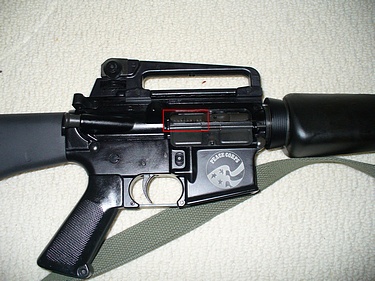
With the dust cover open, you can see the ridges on the bolt of this rifle. When you whack the forward assist,
it actually catches on these ridges in order to help force the bolt forward.
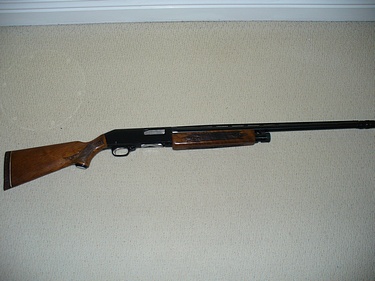
A Ted Williams Model 200 sporting shotgun. This is actually a re-labelled Winchester Model 1200, a true classic.
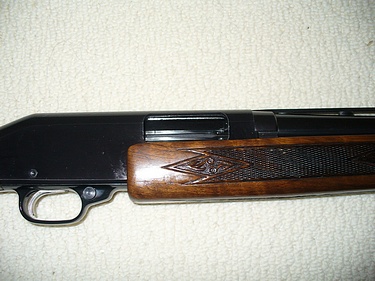
You can see the empty and open action of the shotgun.
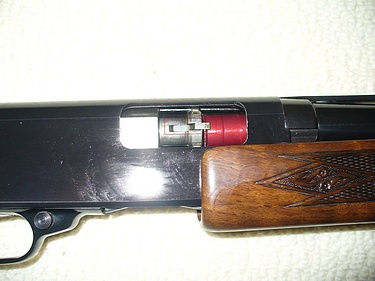
You can see a dummy round hooked on the extractor. Compare this to how it looks when the shotgun
is unloaded. Note that Farcry 2 likes to show casings hooked on extractors, but you usually wouldn't
see something hooked on the extractor when the action is open all the way, as normally the casing
would hit the ejector at that point and fly out of the action. I had to only open the action half
way for this photo or else the dummy round would have been ejected.

You can see the bolt and extractor when the action is half open.
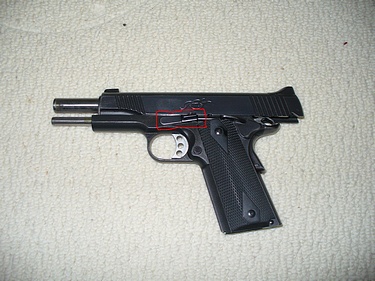
A Kimber TLE 2 Custom with the slide locked back. Here on the left side of the firearm you can see the slide lock,
which locks the slide in the rearmost position against the recoil spring tension.

There is a dummy round still in the chamber, and at the same time the action is
trying to force a fresh round from the magazine into the chamber, which causes the
action to lock up hard. Lock the slide all the way to the rear using the slide lock,
strip the magazine, rack three times to clear the chamber, and then load a fresh magazine,
chamber a round, and reassess the situation.
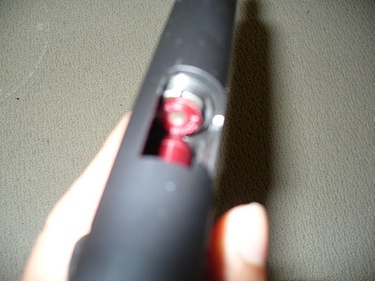
It's a little blurry, but you can see how a dummy round from
the magazine is being forced into the dummy round still occuping the chamber.
|
|
|
|
|
|
|
|













